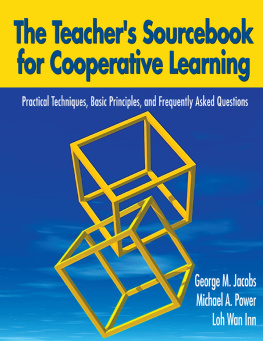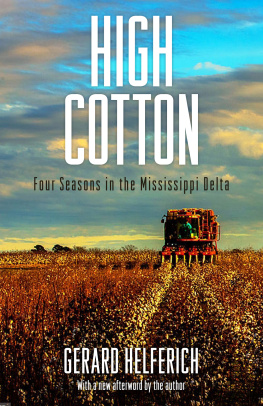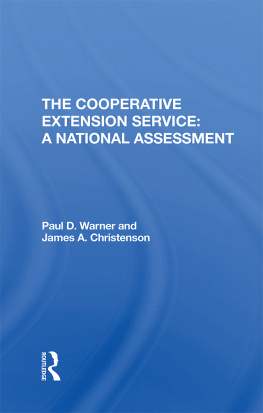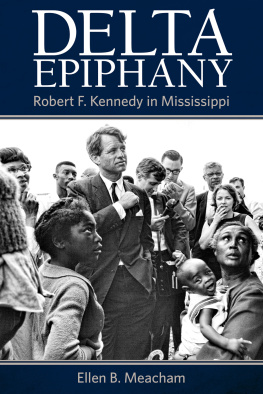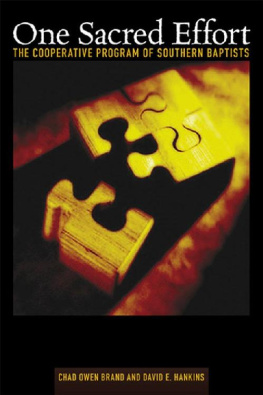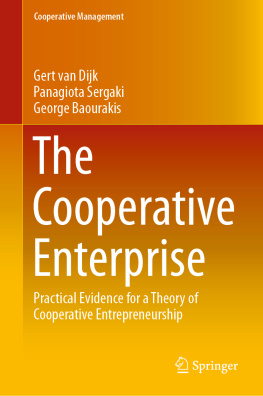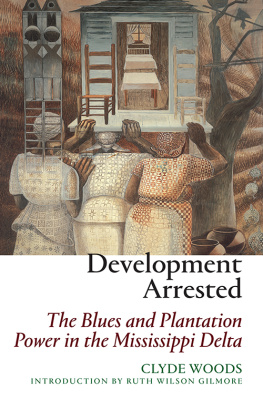Remaking the Rural South
POLITICS AND CULTURE IN THE
TWENTIETHCENTURY SOUTH
SERIES EDITORS
Bryant Simon, Temple University
Jane Dailey, University of Chicago
ADVISORY BOARD
Lisa Dorr, University of Alabama
Grace Elizabeth Hale, University of Virginia
Randal Jelks, University of Kansas
Kevin Kruse, Princeton University
Robert Norrell, University of Tennessee
Bruce Schulman, Boston University
Marjorie Spruill, University of South Carolina
J. Mills Thornton, University of Michigan
Allen Tullos, Emory University
Brian Ward, University of Manchester
Remaking the Rural South
INTERRACIALISM, CHRISTIAN SOCIALISM,
AND COOPERATIVE FARMING IN
JIM CROW MISSISSIPPI
Robert Hunt Ferguson

2018 by the University of Georgia Press
Athens, Georgia 30602
www.ugapress.org
All rights reserved
Set in 10.25/13.5 Minion Pro by Graphic Composition, Inc.
Most University of Georgia Press titles are available from popular e-book vendors.
Printed digitally
Library of Congress Cataloging-in-Publication Data
Names: Ferguson, Robert Hunt. author.
Title: Remaking the rural South : interracialism, Christian socialism, and cooperative farming in Jim Crow Mississippi / Robert Hunt Ferguson.
Other titles: Politics and culture in the twentieth-century South.
Description: Athens : The University of Georgia Press, [2018] | Series: Politics and culture in the twentieth-century South | Includes bibliographical references and index.
Identifiers: LCCN 2017019750 | ISBN 9780820351797 (hardback : alk. paper) | ISBN 9780820351780 (ebook)
Subjects: LSCH: Agriculture, CooperativeMississippi. | Collective farmsMississippi. | Delta Cooperative Farm (Miss.) | Providence Plantation (Miss.) | SharecroppingMississippi. | Rural developmentMississippi. | Christian socialismMississippi. | MississippiRace relations. | MississippiEconomic conditions20th century.
Classification: LCC HD1491.U62 M74 2018 | DDC 334/.6830976209041dc23 LC record available at https://lccn.loc.gov/2017019750
For A.J., Izzy, Hunter, Addy, Grace, Graham, and Greta
May they be the architects of the Beloved Community
And to the memory of Charlie
CONTENTS
ACKNOWLEDGMENTS
Throughout the long process of crafting this book, I have been keenly aware of what E. P. Thompson famously called the enormous condescension of posterity. Many of the characters in this strange but hopeful story left few documents for the historian to piece together in order to begin to understand the complicated, remarkable lives of sharecroppers. Luckily, the founders and managers of Delta Cooperative Farm and Providence Farm left boxes full of primary sources and had most of them deposited at the University of North Carolina at Chapel Hill and Mississippi State University. I must first thank the archivists who meticulously organized these papers and librarians who made my tasks much easier. Of exceptional help were Laura Clark Brown, Matt Turi, and the staff at the Southern Historical Collection at the University of North Carolina; Mattie Sink, Jennifer McGillan, and Jessica Perkins Smith in Special Collections at Mississippi State University; John Wall in Special Collections at the University of Mississippi; Eleanor Green and Emily Weaver at the University Archives at Delta State University; Henry Fulmer in the South Caroliniana Library at the University of South Carolina; Ed Frank and Chris Ratliff in Special Collections at the University of Memphis; Julia Young at the Mississippi Department of Archives and History; Michael Lange and Nathan Kerr at the Oakland Museum of California; and Heidi Buchanan at Western Carolina University.
I began thinking about the themes that shape this book long before I stepped foot in the archives. Three coursestaught by three exceptional historianslaid the intellectual basis for this project. As an undergraduate, I enrolled in Richard Starness seminar on the History of the American South. Richards captivating lectures and carefully chosen readings taught our filled-to-capacity class a history of the South most of us had never heard, but all of us needed. I fell in love with the history of my home region in that class, for all its beauty and tragedy. Since then, Richard has been an important mentor and friend. As an MA student, I took Elizabeth McRaes readings course in African American History. There, I first understood C. Vann Woodward and read Charles Paynes Ive Got the Light of Freedom. Woodwards ideas and Paynes book, more than any others, made me want to write the history of people engaged in the human rights struggle. Our heady class discussions made me feel, for the first time, like a serious scholar. Several years later, Libby and I would colead our own Civil Rights History travel course throughout the South. Libbys steadfast belief in my abilities as an educator and historianand the lessons I learned on that busset me on a path that led to Chapel Hill and eventually back to Cullowhee. Finally, as a PhD candidate, I found myself among a serious and collegial group of graduate students in W Fitzhugh Brundages Readings in the American South course. Fitzs questions and my peers discussions challenged me in ways I found arduous but exhilarating. The first reading list I used to prepare for this research grew from that course. Inspired by Fitzs ideas on southern history, an informal discussion group formed outside of class. With Catherine Conner, Brad Proctor, and other graduate students, the Southern History Drinking Group was born. Due to our excessive focus on the latter, however, the group survived only a few meetings. Fitzs influence has remained constant as he has guided my work with precision and pragmatism. His encyclopedic knowledge of history and culture, eloquent prose, and captivating teaching have influenced me well beyond this project.
I am grateful to a long list of scholars who read or heard portions of the manuscript and offered suggestionsand sometimes their own researchin formal and informal ways. This book began in earnest as a dissertation at the University of North Carolina. I benefitted from the careful criticism of my committee, Fitz Brundage, William Ferris, Jacquelyn Hall, James Leloudis, and Adriane Lentz-Smith. Having these tremendous scholars in one room, discussing my work, was a thrilling honor. Beyond my committee, I am particularly indebted to Lauren Acker, Randy Browne, Andrew Canaday, David Cline, Catherine Conner, Emilye Crosby, John Giggie, David Goldfield, Alison Greene, Valerie Grim, John Hayes, Mark Huddle, Jerma Jackson, Tracy KMeyer, Anna Krome-Lukens, Rachel Martin, Elizabeth McRae, Cecelia Moore, David Palmer, Elizabeth Payne, Adrienne Petty, Brad Proctor, Jennifer Ritterhouse, Mark Schultz, Bryant Simon, Fred Smith, Richard Starnes, Kerry Taylor, Jason Ward, Jeannie Whayne, and the late Jason Manthorne for their insights. Invited talks for the Center for the Study of the American South, the Triangle African American History Colloquium, Georgia College and State University, and Western Carolina University helped me clarify major points of emphasis.
My colleagues at Western Carolina University have been supportive of this project since I joined the faculty in 2012. I could not ask for a better dean and department chair than Richard Starnes and Mary Ella Engel. Saheed Aderinto, Lily Balloffet, Rob Clines, Andy Denson, David Dorondo, Ben Francis-Fallon, Gael Graham, Alex Macaulay, Elizabeth McRae, Scott Philyaw, Honor Sachs, Jessie Swigger, and Vicki Szabo have made working in WCUs Department of History a true pleasure. I am proud to be among such serious scholars, hardworking educators, and witty coworkers.
Next page

